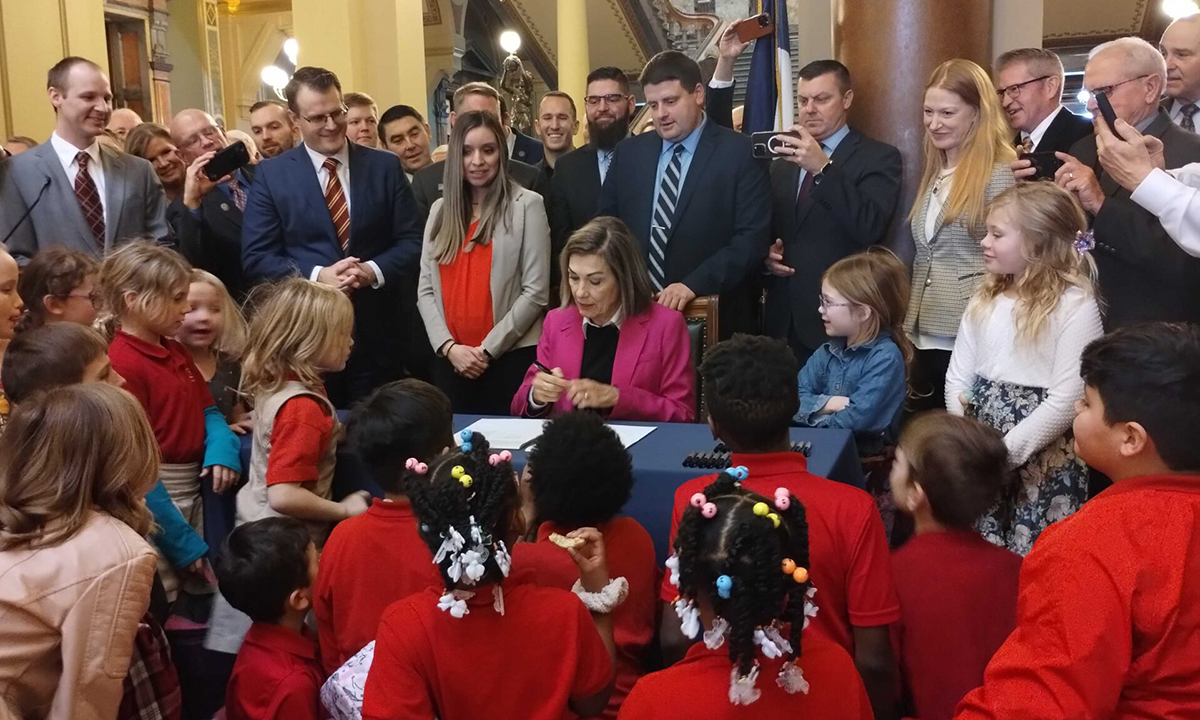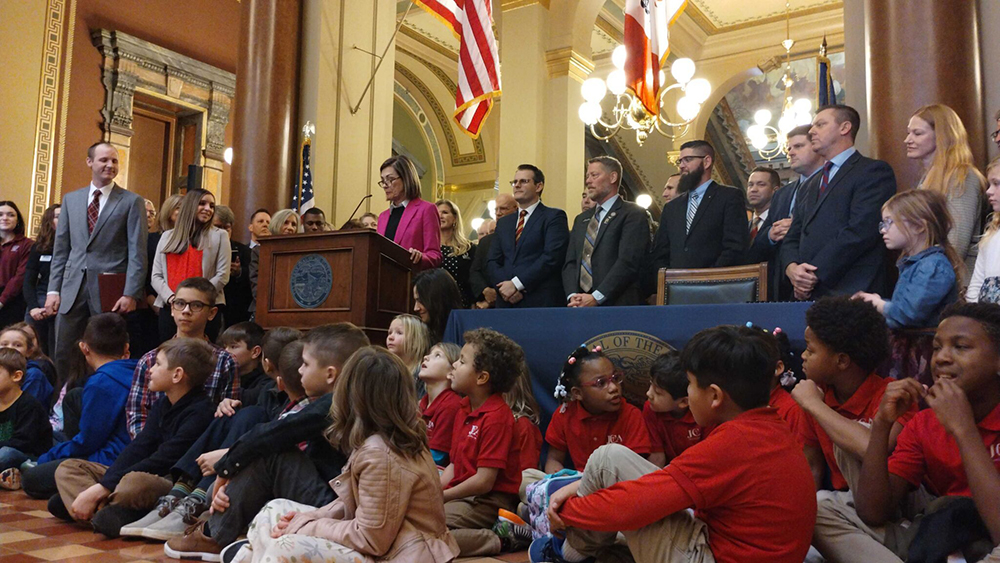After Years of Debate, Iowa Passes Statewide Education Savings Account Program
Gov. Kim Reynolds signed the 'Students First Act' into law this week, establishing a statewide private school scholarship program.

Get stories like this delivered straight to your inbox. Sign up for The 74 Newsletter
After years of debate and a decisive election with school choice at center stage, Gov. Kim Reynolds signed her private school scholarship program into law Tuesday.
Students and staff of Iowa private schools gathered around the lectern in the Capitol rotunda as Reynolds and supporters celebrated passing the legislation, which cleared the Senate less than 12 hours earlier. The governor thanked Republican lawmakers, “school choice” advocates and parents for their work in getting the bill through the legislative process.
“I urged the General Assembly to think big and to aim high, to ignore the hysteria that always accompanies school change,” Reynolds said. “In passing the Students First Act that is what you did, and I cannot think of a more worthy cause to aim high and dream big for than the future of our children.”
The Iowa House and Senate spent nearly 10 hours debating the legislation, which Reynolds named as her top priority for the 2023 legislative session. The law establishes an education savings account (ESA) program for K-12 students, giving students an account of $7,598 each year to use for private school tuition and associated costs.
Starting the 2023-2024 school year, all kindergarteners, Iowa public school students and private school students with a family income of 300% or below the federal poverty line will be eligible to receive funds from the program. The income eligibility expands to 400% of the federal poverty line in the second year and there is no income limit starting in the third year.
While Republicans celebrated the victory, Democrats and public school advocates continued to express disappointment in the legislation. Democratic Sen. Claire Celsi of West Des Moines shouted, “Nobody wants vouchers!” from the rotunda balcony. She was drowned out by a standing ovation for the governor, who said, “We will never give up” on school choice legislation.
Critics said the legislation would harm public schools, especially those in rural areas. Iowa State Education Association President Mike Beranek said by passing the governor’s bill, legislators were ignoring their constituents’ wishes. Almost three-fourths of Iowa public schools are counties with no option for private schools, he said, and this legislation prioritizes private school students over the 92% of Iowa students in public schools.
“Make no mistake, this is not a war between public schools and private schools,” Beranek said in a statement. “It is a conflict between how taxpayer money is spent on private schools without equal access and no accountability or taxpayer oversight. Elected officials have a responsibility to serve all the people of our great state. This legislation serves just a few, with all the people’s money.”
But the governor said the bill helps Iowa’s public education system and teachers by allowing schools to put certain unspent categorical funds, such as dollars for talented and gifted programs, toward teacher salaries.

“We’re gonna continue to work with them and see if there’s other things that we can do to help so it’s not a one and done,” Reynolds told reporters. “We’re gonna continue to monitor it. Just make sure that we’re meeting the mark and doing what we intended.”
Estimates from the governor’s office and Legislative Services Agency estimate the program will cost $106.9 million in the upcoming fiscal year, and will cost roughly $345 million per year once income restrictions are fully phased out. But Democrats questioned whether the state will see additional costs when working with a third-party vendor to administer the program.
The governor said a request for proposals (RFP) on the program contract will be posted Tuesday, which will contain details on potential associated costs. It will also address concerns for transparency, she said. Other states with private school scholarship programs, like Arizona, have had instances of educational companies or parents using state funds fraudulently.
The state’s contract will put “parameters in place” to give the state recourse if problems occur with Iowa’s program, she said.
“We’re going to make sure that cybersecurity is taken into account,” she said. “We want to make sure that we do have transparency and accountability in place, so that we can monitor it to make sure that there isn’t any fraud. And that’s why we’re really being very purposeful about issuing the RFP.”
The ESA program is not the end of the road for Republicans’ education reform goals this session. Reynolds also highlighted in her Condition of the State address a renewed push for “parental rights” in public schools, calling for increased transparency measures such making all class materials and student records accessible to parents.
House Republicans have also introduced bills focused on curriculum and LGBTQ+ issues in Iowa public schools. Proposals include requiring school districts to get written consent from a child’s parent or guardian before providing any accommodations in using a transgender student’s preferred name or pronouns, as well as banning instruction or material on sexual orientation or gender identity to students in kindergarten through third grade.
Republicans brought up LGBTQ+ issues in public schools as a reason why parents demanded alternatives to Iowa’s public school system in the ESA program debates Monday. Sen. Jesse Green, R-Boone, said some Iowa public schools’ policies, such as letting transgender children use the restrooms and locker rooms which match their gender identity, prevent Iowans from having their children educated “without violating their values.”
“If we can’t trust some of our public schools on biology in the bathroom, what makes us believe that we can trust those same schools on biology in the classroom?” Green said. “… Yet on something so fundamental is basic biology, (parents) currently have no choice in public schools.”
Iowa Capital Dispatch is part of States Newsroom, a network of news bureaus supported by grants and a coalition of donors as a 501c(3) public charity. Iowa Capital Dispatch maintains editorial independence. Contact Editor Kathie Obradovich for questions: info@iowacapitaldispatch.com. Follow Iowa Capital Dispatch on Facebook and Twitter.
Get stories like these delivered straight to your inbox. Sign up for The 74 Newsletter

;)